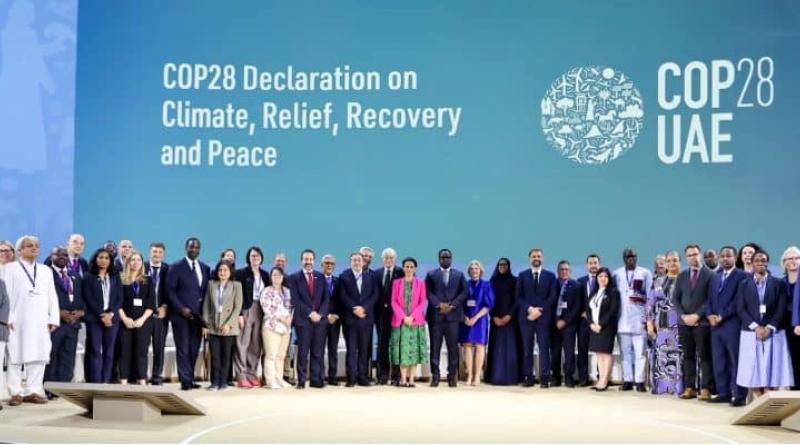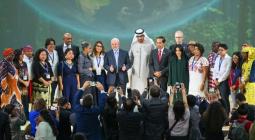COP28: climate action for health, the States make a commitment in Dubai

"A declaration on health and climate. It's about time, at a time when climate change is increasingly threatening human physical, mental and physiological health. The text, drawn up by the United Arab Emirates (UAE), with the support of 11 countries including Egypt, and the World Health Organisation (WHO), was unveiled on 2 December 2023 in the village of COP28.
The negative impact of climate change on human health is finally being recognised internationally. “The effects of climate change are already upon us. They have become one of the greatest threats to human health in the 21st century,” said Al Jaber, President of the 28th United Nations Conference of the Parties on Climate Change (COP28) on 2 December 2023 at Dubai’s Expo City. He was speaking at the ceremony to present the United Arab Emirates (UAE) declaration on climate and health, on the eve of the day dedicated to health. “The text sends out a strong signal: we must reduce global greenhouse gas (GHG) emissions and work together to strengthen our health systems”, added the official.
Climate change has serious consequences for human health. The UAE reports that 189 million people are exposed to extreme weather events such as heat waves, storms and floods every year. The consequences range from food-borne, water-borne and vector-borne diseases to mental health problems and death in the worst cases, according to the report Climate Change and Health, published on 12 October 2023 by the World Health Organization (WHO). Climate change also has an impact on air pollution, which is responsible for the deaths of 9 million people around the world every year.
The declaration already signed by 123 countries
In order to draw up a comprehensive document on health and climate, the UAE collaborated with the leaders of 11 other countries, including Brazil, Malawi, the United Kingdom, the United States, the Netherlands, Kenya, Fiji, India, Egypt, Sierra Leone and Germany, as well as the WHO, which has been raising awareness of the effects of climate change on health for several years now, in order to encourage states to take resilience measures for public health.
The declaration, to which 123 countries have already committed in Dubai, covers a series of areas for action at the intersection of climate and health, including building more climate-resilient health systems, strengthening intersectoral collaboration to reduce GHG emissions and maximise the health benefits of climate action, and increasing funding for climate and health solutions. As there are only ten steps between health and climate, which represent Sustainable Development Goals 3 and 13 respectively (SDG3 and SDG13), the signatories have also committed to integrating health policies into their national climate plans. Strengthening international collaboration will therefore be necessary to address the health risks of climate change, particularly at future Conferences of the Parties.
At the COP28 village, it was also recognised that financing will be a key driver for the success of the Declaration unveiled in Dubai, the implementation of which should help to keep the 1.5°C threshold within reach as advocated by the Paris Agreement. “Malawi has experienced these impacts first hand – extreme weather events that have displaced tens of thousands of our citizens and unleashed epidemics of infectious diseases that have killed thousands more. We call for a bolder path forward that prioritises investment in health and well-being, ensures a just transition away from fossil fuels and creates a healthier future for us all,” said Lazarus Chakwera, President of Malawi at COP28.
Some $1 billion already committed to meet the growing needs of the climate-health crisis
A series of new financial commitments on climate and health were also announced to support this multilateral political will, including a $300 million envelope from the Global Fund to prepare health systems, $100 million from the US Rockefeller Foundation to scale up climate and health solutions, and an announcement from the UK government of “up to £54 million”, more than $68 million.
In Dubai, development partners, non-governmental organisations (NGOs) and governments collectively pledged 1 billion dollars to meet the growing needs of the climate-health crisis.
Still on the subject of financing, the COP28 Presidency joined forces with the Global Fund to Fight AIDS, Tuberculosis and Malaria, launched in 2002, the Green Climate Fund (GCF), headquartered in South Korea, the Rockefeller Foundation and the WHO, currently headed by Ethiopian biologist Tedros Adhanom Ghebreyesus, to unveil a set of ten principles. They aim to strengthen climate and health financing, mobilise new and additional funds, and encourage innovation with transformative projects and new multi-sectoral approaches. Strengthening the core capacities of countries, communities and financial institutions to develop and implement policies, and integrating climate and health objectives into financing strategies, are two of the principles.





